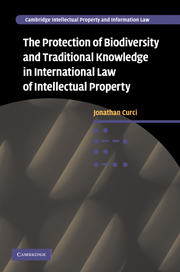Part III - The protection of traditional knowledge in the international patent system
Published online by Cambridge University Press: 04 August 2010
Summary
Part III focuses on the IP methods of redistribution of benefits with TK holders in the international trade context and analyzes the proposals that have been put forward by governments, the international legal doctrine, the recommendations of international organizations, statements made by States, and NGO-sponsored studies in order to make the IP system more supportive of the benefit-sharing treaty provisions.
In this regard, it will be necessary to outline a few preliminary relevant conceptual distinctions along with a clearer definition of the legal concept of TK so as to present some viable options including some CBD principles in the implementation of the TRIPS Agreement (see section 4.2 below).
The main existing options within the narrow boundaries of IP laws to internationally protect TK attached to GRs are both “defensive” and “positive/offensive”.
Among the defensive protection mechanisms, the introduction of a certificate of origin in the patent examination system can help trace more easily acts of misappropriation of GRs. This can encourage compliance with the obligations under the CBD, i.e. the duty of bioprospecting companies to negotiate an agreement with the provider country concerning the conditions of GRs' utilization (see section 5.2 below). PIC implementation can occur through the introduction of disclosure requirements and certification about the GRs issued by the country of origin during the application procedure at the Patent Office of the recipient State. Apparently a simple requirement, the submission of certificates of origin is surrounded by difficulties and inconsistent interpretations both within WIPO and the TRIPS Council.
- Type
- Chapter
- Information
- The Protection of Biodiversity and Traditional Knowledge in International Law of Intellectual Property , pp. 87 - 90Publisher: Cambridge University PressPrint publication year: 2009



